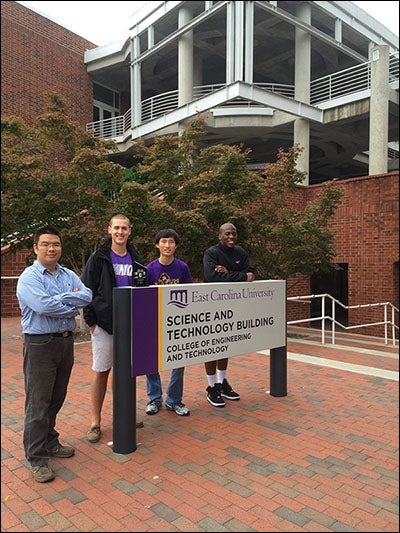Engineering students’ flying vehicle takes second in national competition

From left to right, Dr. Zhen Zhu and ECU engineering students Logan Cole, Alan Register and Tyree Parker. (Contributed photo)
By Margaret Turner
ECU College of Engineering and Technology
Three East Carolina University undergraduate engineering students built a flying vehicle this summer that took second place in a unique national competition.
The students, led by ECU Assistant Professor of Engineering Zhen Zhu, competed against six other universities at the Autonomous Aerial Vehicle Competition at the 2014 Ohio Unmanned Aircraft Systems Conference in Dayton, Ohio. The competition, the first of its kind, was part of the Air Force Research Laboratory Sensors Directorate.
Students Logan Cole, Tyree Parker and Alan Register are members of ECU’s student chapter of the Institute of Electrical and Electronics Engineers. Zhu, faculty advisor for the organization, said the student team used very low cost materials to build the aircraft. Most competitors had larger budgets and were able to use higher end materials and sensors.
Cole and Register attended the competition with Zhu.
The students’ vehicle was required to use autonomous navigation and target geo-location in a GPS-denied environment. The vehicle had to fly autonomously and find an object and record its coordinates. “It was a difficult task for a relatively young group of students. Many of the teams consisted of graduate level students and ours are all undergraduates,” Zhu said.
The competition was divided into three parts: demonstration, a written report and an oral presentation. The team took first place in the flying portion. “The design and concept was done by the students,” Zhu said. “I was most impressed with how well we did using the lower cost materials and open source software.”
Register, a sophomore biomedical engineering student, got involved at Zhu’s request after working on another unmanned aerial vehicle competition earlier in the year. “In this competition, we experienced real world situations like signal interferences that can’t be simulated in a lab,” Register said. “As an engineer, we want to experience real world problems and not just produce an ideal solution.”
Cole, a senior, learned how to read and write C code, a frequently used programming language. “I want to work with microcontrollers after college so this is a great way to get some firsthand experience,” he said.
The College of Engineering and Technology has more than 20 active student organizations, which provide opportunities for competitions, learning outside of the classroom and networking. For more information, visit http://www.ecu.edu/cs-tecs/student_organizations.cfm .